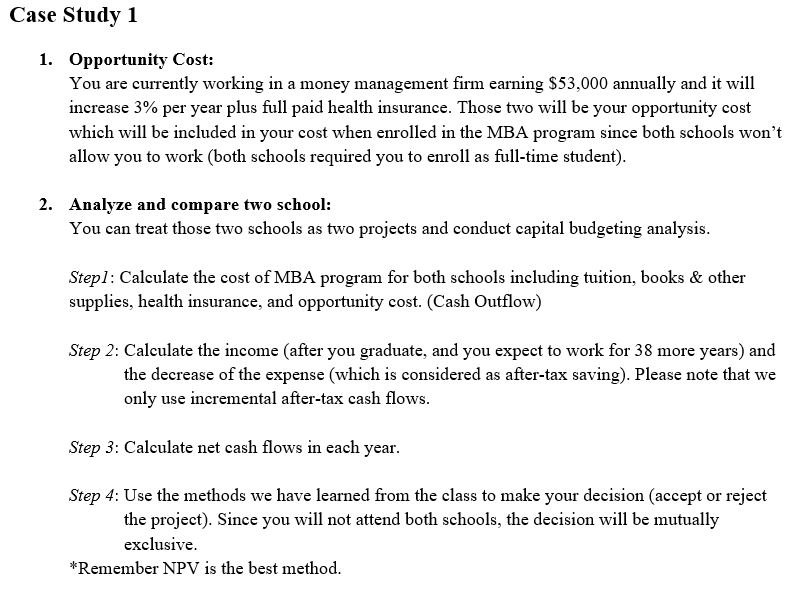
Instructions:

You graduated college six years ago with an undergraduate degree in Finance. Although satisfied with your current job, your goal is to become an investment banker, and you wonder if an MBA degree would allow you to achieve that goal. After examining schools, you have narrowed your choice to either Wilton University or Mount Perry College. Although internships are encouraged by both schools, to get credit for the internship, no salary can be paid. Other than internships, neither school will allow students to work while enrolled on the MBA program. However, thanks to a bequest from your grandmother, your savings account has enough money to cover the entire cost of the MBA program You currently work a money management firm, earning $53,000 annually. Your salary is expected to increase 3% per year until retirement. You expect to work for 38 more years. Your current job includes a fully paid health insurance plan. Your current average tax rate is 26%. The Ritter College of Business at Wilton University is one of the top MBA programs in the country. The MBA degree requires 2 years of full-time enrollment at the university. Annual tuition is $58,000, payable at the beginning of each school year. Books and other supplies are estimated to cost $2,000 per year. Upon graduation from Wilton you expect to receive a job offer for about $87,000 per year, with a $10,000 signing bonus. Because of the higher salary, your tax rate will increase to 31%. Annual salary increases are expected to be at 4% per year. The Bradley School of Business at Mount Perry College began its MBA program 16 years ago. The Bradley School is smaller and less well known than Ritter College. Bradley offers an accelerated one- year program; cost of tuition for the program is $75,000, to be paid upon matriculation. Books and other supplies are expected to cost $4,200. You think that you will receive an offer of $78,000 per year upon graduation, with an $8,000 signing bonus, resulting in an average tax rate of 29%. The salary at this job would increase 3.5% per year. Both schools offer comparable health insurance that will cost $3,000 per year, payable at the beginning of the year. Both schools also offer graduate housing, that will result in a decrease to your current room and board expenses of $4,000 per year, whichever school you attend. Assume the appropriate discount rate is 5.5%. REQUIRED: Respond to the following questions. Each response must comprise at least three complete sentences, with proper grammar and punctuation. All calculations that support your answers must be shown in their entirety. Cite any referenced materials using APA format. 1. Does your age affect your decision to get an MBA? If so, how? 2. What other, perhaps nonquantifiable, factors affect your decision to get an MBA? 3. Assuming all salaries are paid at the end of each year, what is your best option from a strictly financial standpoint? 4. A friend suggests that the appropriate analysis is to calculate the future value of each option. How would you evaluate this statement? 5. What initial salary would you need to receive to make you indifferent between attending Wilton University and staying in your current position? 6. Suppose that instead of being able to cover the cost of the MBA from your savings, you must borrow money. (The current borrowing rate is 5.4%) How does this affect your decision? Case Study 1 1. Opportunity Cost: You are currently working in a money management firm earning $53,000 annually and it will increase 3% per year plus full paid health insurance. Those two will be your opportunity cost which will be included in your cost when enrolled in the MBA program since both schools won't allow you to work (both schools required you to enroll as full-time student). 2. Analyze and compare two school: You can treat those two schools as two projects and conduct capital budgeting analysis. Stepl: Calculate the cost of MBA program for both schools including tuition, books & other supplies, health insurance, and opportunity cost. (Cash Outflow) Step 2: Calculate the income (after you graduate, and you expect to work for 38 more years) and the decrease of the expense (which is considered as after-tax saving). Please note that we only use incremental after-tax cash flows. Step 3: Calculate net cash flows in each year. Step 4: Use the methods we have learned from the class to make your decision (accept or reject the project). Since you will not attend both schools, the decision will be mutually exclusive. *Remember NPV is the best method. You graduated college six years ago with an undergraduate degree in Finance. Although satisfied with your current job, your goal is to become an investment banker, and you wonder if an MBA degree would allow you to achieve that goal. After examining schools, you have narrowed your choice to either Wilton University or Mount Perry College. Although internships are encouraged by both schools, to get credit for the internship, no salary can be paid. Other than internships, neither school will allow students to work while enrolled on the MBA program. However, thanks to a bequest from your grandmother, your savings account has enough money to cover the entire cost of the MBA program You currently work a money management firm, earning $53,000 annually. Your salary is expected to increase 3% per year until retirement. You expect to work for 38 more years. Your current job includes a fully paid health insurance plan. Your current average tax rate is 26%. The Ritter College of Business at Wilton University is one of the top MBA programs in the country. The MBA degree requires 2 years of full-time enrollment at the university. Annual tuition is $58,000, payable at the beginning of each school year. Books and other supplies are estimated to cost $2,000 per year. Upon graduation from Wilton you expect to receive a job offer for about $87,000 per year, with a $10,000 signing bonus. Because of the higher salary, your tax rate will increase to 31%. Annual salary increases are expected to be at 4% per year. The Bradley School of Business at Mount Perry College began its MBA program 16 years ago. The Bradley School is smaller and less well known than Ritter College. Bradley offers an accelerated one- year program; cost of tuition for the program is $75,000, to be paid upon matriculation. Books and other supplies are expected to cost $4,200. You think that you will receive an offer of $78,000 per year upon graduation, with an $8,000 signing bonus, resulting in an average tax rate of 29%. The salary at this job would increase 3.5% per year. Both schools offer comparable health insurance that will cost $3,000 per year, payable at the beginning of the year. Both schools also offer graduate housing, that will result in a decrease to your current room and board expenses of $4,000 per year, whichever school you attend. Assume the appropriate discount rate is 5.5%. REQUIRED: Respond to the following questions. Each response must comprise at least three complete sentences, with proper grammar and punctuation. All calculations that support your answers must be shown in their entirety. Cite any referenced materials using APA format. 1. Does your age affect your decision to get an MBA? If so, how? 2. What other, perhaps nonquantifiable, factors affect your decision to get an MBA? 3. Assuming all salaries are paid at the end of each year, what is your best option from a strictly financial standpoint? 4. A friend suggests that the appropriate analysis is to calculate the future value of each option. How would you evaluate this statement? 5. What initial salary would you need to receive to make you indifferent between attending Wilton University and staying in your current position? 6. Suppose that instead of being able to cover the cost of the MBA from your savings, you must borrow money. (The current borrowing rate is 5.4%) How does this affect your decision? Case Study 1 1. Opportunity Cost: You are currently working in a money management firm earning $53,000 annually and it will increase 3% per year plus full paid health insurance. Those two will be your opportunity cost which will be included in your cost when enrolled in the MBA program since both schools won't allow you to work (both schools required you to enroll as full-time student). 2. Analyze and compare two school: You can treat those two schools as two projects and conduct capital budgeting analysis. Stepl: Calculate the cost of MBA program for both schools including tuition, books & other supplies, health insurance, and opportunity cost. (Cash Outflow) Step 2: Calculate the income (after you graduate, and you expect to work for 38 more years) and the decrease of the expense (which is considered as after-tax saving). Please note that we only use incremental after-tax cash flows. Step 3: Calculate net cash flows in each year. Step 4: Use the methods we have learned from the class to make your decision (accept or reject the project). Since you will not attend both schools, the decision will be mutually exclusive. *Remember NPV is the best method








